There is forward progress on The Hip Pocket as a podcast. I promise.
I’m talking to our first handful of guests right now, and we’re getting ready to record the last of these warm-up episodes. As you listen to this, please keep in mind these are all warm-ups. This is not the final format of the show or a fair indication of what to expect, audio-wise, once we’ve got our set-ups all figured out. The point of these early episodes is to get to know each other and to figure out how to technically put our show together, and I want to share the episodes with you guys as a way of being transparent about how we’re progressing.
So far, we’ve recorded eight episodes, and I’ve released six of them on the Patreon. I’ll be posting them all here before we launch the actual podcast, so you’ll be part of this development process just like the patrons are right now. If you missed it, the first one is right here.
I am so grateful that Craig Ceravolo and Aundria Parker are willing to indulge this idea of mine from very different remote locations, and I’m enjoying the conversations we’re having so far. In the first episode you heard, we each picked a title from any decade, so you got some very disparate eras represented in that conversation. This time, we’re all picking something from the 1940s, and I thought that might create a little more of a coherent through-line between our choices.
Nope. But to be fair, this is exactly what I wanted. I think all three of us approach each of these lists very differently, and that’s good. Once we add guests into the mix, it’s going to be even more interesting to see how wide a variety of things we end up discussing.
Let’s jump right into it, and as I did last time, I’ve included a transcript here for those of you who would rather read the conversation than listen to it. Thanks for giving us your time and attention, and here’s hoping you enjoy this visit with The Hip Pocket.
DREW: Hi everyone, Drew McWeeny here. You may know me from my time at HitFix or from the early work I did at Ain’t It Cool, or maybe you read one of my Substack newsletters. Whatever the case, welcome. I am very glad that you are here for my new adventure with my two good friends, The Hip Pocket. The Hip Pocket, for those of you who have not heard this concept before… these are the movies that we carry around with us. Movies that mean something special to us. Movies that we love to share with people.
Sometimes they're a litmus test to see if you're on the same page as somebody, or you want to show them this thing that means so much to you as a way of expressing who you are. Or sometimes, it's as simple as this thing makes me happy and I hope it makes you happy too.
Whatever the case, I think you learn a lot about people when you talk about these films and why they matter. I have hundreds of these movies like this for me, movies that have stuck with me for one reason or another over the last thirty years of writing films and writing about them. I'm joined by two friends who I look forward to sharing these movies with for years to come.
First up, there's our bandleader, Craig Ceravolo. Hi, Craig. How are you doing today?
CRAIG: Hey, Drew. Thanks for another ride.
D: Yeah, absolutely. I am glad to have you here for this today. And of course, we couldn't do any of this without the jelly to my peanut butter.
AUNDRIA: Here we go.
D: My co-host, the one and only Aundria Parker. Aundria, how you doing?
A: Hi, Drew. It's jelly checking in. I like to think of myself more as jam, but we can work on that.
C: Can I be the... am I the bread?
A: What does that mean?
D: You're a banana, Craig.
C: Okay, that's fine.
D: Yeah, you’re in the South, man. No... I am excited today because this is the first of our regular sort of format. We're gonna do a different decade each episode during the rest of this warm-up run, and we are gonna just start, jump in with the 1940s, which was... a weird decade. The first half of the decade is scarred by war. The second half is nothing but rapid change and rebuilding and economic growth. It is a weird, weird time.
This is the decade that gave us radar and the microwave oven and the frisbee and Tupperware and Velcro and the motherflippin' Slinky. It is a great decade and it also gave us three pretty cool movies that we're going to discuss today on The Hip Pocket.
Craig, we're going to kick off with your pick this time. And this is one of the things I got really excited about when we sent these lists back and forth to each other. I have known you for almost 20 years. And I had no idea the appetite that you have for women's weepy melodramas from the ‘40s and ‘50s. And dude, I'm here for it.
C: I love it.
D: I was delighted to see you pick Mildred Pierce.
[the Mildred Pierce trailer plays]
D: What is up?
C: Okay, well, I think you know one of the reasons why I love it so much. My daughter, my second daughter, what is her name?
D: Veda.
C: It's Veda.
D: Yes.
C: Their mom, when we were together at the time, we were trying to think of kid names. We were watching Mildred Pierce and the name early on, Veda, kept coming up. That's the daughter's name. Did you not know that?
D: I did not know that that's where it came from. Oh, my God, that's so great.
A: (laughing)
C: We've gone 20 years without you knowing this story?
D: I had no idea. I’m delighted.
C: So anyway, that's the name. That's the name we're choosing. Now this is before the entire story unravels…
D/A: (laughing)
C: … but it was… it's too late. We're locked in on Veda and I would like to just say 14 years later… she's not that bad.
D: I love it.
C: 1945, and it's Joan Crawford at her most Joan Crawford-est, as you can possibly imagine. I freaking love this movie, even regardless of the Veda connection. She gives the most incredible performance. It's based on a novel, which I've never read and I really should read it. Did you ever read it? Anyone ever read it?
D: I’m a big James Cain fan, and it's weird because I would not call this a film noir…
C: I would!
D: … but James Cain is best known for Double Indemnity, and he is a noir author. His stuff is soaked in darkness.
C: This definitely has noir vibes.
D: It's weird. It walks this line where I think Michael Curtiz is one of those guys who can do anything. When you look at The Adventures of Robin Hood or you look at Casablanca or you look at this, these three radically different types of films, and he's perfect for each one. Like he understands genre and he understands what is required. But what's wonderful about this is that it doesn't fit neatly into any one thing. Like the melodrama to me is what's really strong and memorable. And Joan Crawford is just this pillar of suffering for the entire movie and just this… they just pile torture on her and it is ultimately about her and her reasons for not breaking and how she keeps moving forward, and it's it's a hell of a performance. But it feels to me like a women's picture, not like a noir crime film.
[clip from Mildred Pierce plays]
C: Yeah, I can see that. But I mean, it also, as a parent, it makes me go, you do whatever you… you're going to do whatever you can do until there's a breaking point. And I hope that none of us ever have to reach this decision, not to get into it, but I mean, you do what you can, right or wrong for your kids. And I really did connect with that through-line from this film. And in repeated viewings… I loved it from the get-go, obviously. I mean, we named our daughter after this character. As I’ve watched it through the years through this parenting journey, I started relating to aspects of it more and more. To where you’re like, “Oh my god, these kids, you do whatever you can, rightly or wrongly. Am I spoiling my kid? Am I not? Am I, am I doing this right?” And it's a cautionary tale.
D: Yes! And you can do the same thing for two different kids and get two different results. And that is truly the thing that makes you crazy as a parent.
C: Yeah. So that's, that's the true… that's the connection on this one. And we'll talk, we'll talk about the other ones as we move into different episodes, but that's what makes me love this. So I'm very curious what you guys thought about this.
D: Well, yeah. Aundria, is this one that you're familiar with?
A: Not at all. I knew that there was a show that they did a few years back with Kate Winslet, which I had intended to watch. Had not seen the movie. It's another one. Craig hit it out of the park. Um, damn, this is a good movie. Damn, this is a good movie. I feel like I'm the only person on earth who hasn't seen this movie and also maybe the only person on earth who has seen this movie. Like why aren't people talking about this every single day?
D: Yeah, I love the framing device. I love the use of the framing device as a way of then forcing you to ask questions about Mildred's life and how she got to that place. And it is so masterful the way they lay out each step then of how she got to the low point that she did, why she makes the choices she does. The performances in this thing are unreal. She deserved that Oscar. This is truly a woman who gives a one-of-a-kind home run performance in a film.
C: Did she win the... she won, right?
D: Yeah, she won. Yeah, yeah. Yeah, this is one of her Oscars, and deservedly. Like, it's just an unbelievable piece of work. I really... I do find the daughters in this movie are both so compelling and interesting, and truly, Veda is one of the more memorable monsters we're going to encounter on this show.
A: Completely agree.
D: She is fascinating and every time you think you have a handle on her as a character, they do not make that choice. They don't ever give her that moment of, “Okay now she's gonna break and she's gonna come back and there's gonna be the Hollywood ending,” and this is not that movie, man. She is determined to be who she is, no matter what it costs her mother, and god, it's wild to watch and uh… devoted. A devoted performance is the only way to describe it. Anne Blyth is unreal in this film.
C: She's a sociopath. I mean, it's an amazing...
A: One of the great villains.
C: I mean... Oh, yeah.
[clip from Mildred Pierce plays]
C: I really hope my daughter never sees this.
A: [laughs] “This is your namesake.” Um, I’ve never seen a performance where Eve Arden is so young, either. I know Eve Arden mostly from Grease. I know her from Fairy Tale Theater. Seeing her as this right-hand man for Mildred was incredible. She was so compelling. She was just lovely. I loved watching her shoulder pads three miles wide. Oh, love it.
D: I love when people did, and this is one of those things that growing up in the 70s and 80s and watching movies when I did… like you mentioned On Golden Pond earlier. When I saw that, that was my introduction to Henry Fonda and Katherine Hepburn. So then for me later, going back and seeing films of them as young people was so weird because I had met them on screen as very old people. And there is that… there's that thing that happens where I think with a lot of film viewers, earlier eras of Hollywood feel kind of walled off from things, and it's hard to imagine you will connect to things from the ‘40s, the ‘50s, the ‘30s in whatever way… but you watch this… Joan Crawford is so compelling and so modern and so relatable as this woman who is building this empire that is independent of any man or anybody else, or she is figuring out how to make the world work for her. And that is a fight that I'm sure there are plenty of people still fighting right now and fighting this way. And I think it's remarkable. Like, I love that there is nothing about this that feels dated. She doesn't feel like she's giving a performance from another era. Everything she does, I recognize.
C: Yeah. And I think, Aundria, you mentioned the HBO miniseries earlier.
A: Yeah. Yeah. I never saw it, but I knew that it existed and, you know, I really want to watch it now because how could you not?
D: Yeah. But talk about setting a high bar for yourself. Who wants to compete with that performance?
C: I can't. I don't. I love both those actors. I love, uh, um, who was it? Give me, give me my, the names are slipping me of the new one. I know it was Winslet and I don't know who else was in it.
A: And Evan Rachel Wood played Veda, which is, oh my God, which is great.
C: But it wasn't as compact and tight as I… you know, I have an affection for the ’45 version.
D: And this thing moves… this thing covers, whatever, like five or six years, and it covers it at a gallop. It never takes a breath.
A: Yeah. There's a lot of story.
D: I really, I find the way this, I find the way this thing sort of walks that weird line between genres… I find that really compelling. It is a, an unusual film. I think Curtiz, Michael Curtiz, deserves a lot of credit for figuring out how to navigate that tone, because, man, you go one way or another… if this tips into melodrama too much, it doesn't work. If it's just a crime film, you're not going to identify with Mildred. He had to get all those elements exactly right in order to invest you emotionally for the ending of this thing to pack the wallop it does.
C: That's beautiful.
A: And like you said, it feels very realistic. It doesn't fall over into melodrama at any point. It's so… authentic, I guess is the word. Even when Veda is doing these... huge arching villainous things, you know it’s, um…
D: She's the worst. She truly is the worst.
C: Veda, my daughter, if you're listening, I'm sorry that we did that. I'm sorry.
D: It's a beautiful name!
A: It's a great name. We love you, Veda.
[Joan Crawford yells “VEDA!”]
D: In terms of, uh, like, things that are important to us, I guess your pick for this decade, Aundria, raises the question for me, how important overall is animation to you?
A: That's a great question.
D: Because I know when I moved to Los Angeles, maybe the first people that I met and became friends with were animators. Because to me, animation has always been kind of a magic trick. And I really wanted to demystify it and get to know the people that did that magic trick so I could understand it better.
A:I think for me, there has always been mystery around animation, especially when it's mixed with the human element, something like Roger Rabbit, especially because I saw that very young. This, my pick for the ‘40s, Fun and Fancy Free, was something that I watched over and over and over.
[Fun and Fancy Free trailer plays]
A: I have not seen it in years. Rewatching it was... it really highlighted what a bizarre movie it is. You know, it's not a feature-length animation film. It's two animation movies that are glued together with a ventriloquism segment. How do you describe this movie? It's so weird. It's so weird.
C: I can't.
D: I gotta tell you, there is nothing that entertains me more than the idea of a ventriloquist who became famous on the radio. That is awesome. That is as American as America gets. And he's a terrible ventriloquist.
A: He’s not great!
D: There are scenes in this movie where he's talking and he's on camera and you're just, he's talking. I can see him talking. It's like he's not trying to disguise that he's talking.
[clip from Fun & Fancy Free plays]
C: Again, Aundria, I have a bigger fear of ventriloquist dummies than I do of heights, which we talked about in a previous episode, so, um… what are you doing to me?
D: Craig, I have a story to share with you real quick.
C: Oh, god.
D: David Copperfield… in his place in Las Vegas… he has a museum…
C: Fuck off.
D: … that is his personal museum…
C: Fuck all the way off.
D: … and when you go and you take the tour, he takes you to this room and the door opens…
C: Nuh-uh.
D: … and it is about 400 ventriloquist dummies including the one from Twilight Zone where Cliff Robertson turns into his own dummy by the end of the episode. And he just has them all in a room there. And he's like, yeah, I wanted to be a ventriloquist first before I wanted to be a magician. And that's all you need to know about David Copperfield. That tells you everything about him as a person.
C: This is audio, but you guys can see I am physically uncomfortable thinking about this right now.
D: That room, all I could picture was what happens if I step in and the door closes.
A: Oh my god. Oh my god.
D: I will die. Like this room is the worst room I've ever been in.
C: Man, my daughters watched that Goosebumps shit and it would just freak me out. I just can't deal with it.
D: Yeah, this must have been a delight for you then.
C: It was great.
A: I remember as a kid at some point, too, I had seen this movie so many times. I knew who Charlie McCarthy was. I knew who Edgar Bergen was. I knew who Candace Bergen was. And for some birthday or something, I got like $20. I got a $20 bill. and I went to the toy store. It was Child World, which doesn't exist anymore. And they had Charlie McCarthy, Mortimer Snerd, and some other damn Edgar Bergen ventriloquist dummy. I was this close to bringing home a Charlie McCarthy.
And then I was like, no, I'm not. I didn't want to learn it. Like, I thought it would be cool to have him, but I was like, I'm not going to learn how to do that. But there was a moment. That would have been a real turning point for me, I think. I don't know.
D: Yeah, that's the road not taken there, Aundria, really.
C: Just think about how your life would be different if you took it. You'd be like in Vegas right now with your myriad of demonic wood dolls.
A: I’d probably be in that room, David Copperfield's room, stuffed. Oh, my God.
D: Oh, God, yes. Oh, my Lord.
C: So I didn't know this existed. I'm not going to lie to you. I went, what is Fun and Fancy Free? I had no idea what it was. So when I looked at it, I went, oh, this is a Disney thing. So again, a Mandela effect where I had no idea this existed. I really enjoyed it.
D: Had you seen either of the segments separate before?
C: Yes.
D: Because I, seriously, Mickey and the Beanstalk is maybe one of the more famous things they did.
A: I feel like that's been repackaged.
D: And lived by itself for so long.
A: Yeah.
D: It has. It's been repackaged. I remember I had the ViewMaster version of Mickey and the Beanstalk.
C: I did too!
D: And that's where I knew Mickey and the Beanstalk from so intimately. Like watching this, it's weird because it's a longer version. You get the complete thing. And there's moments where you're like, “Oh, wow, this image is burned into my brain somewhere deep, deep, deep, where I don't even remember the segment, but the images are just part of my DNA somehow.”
A: So cool.
D: And I do think with early Disney… especially growing up in the 70s, they repackaged this stuff in such a way that we grew up soaked in it, even though maybe we hadn't seen the real films like Fun and Fancy Free or the one that Three Caballeros comes from. Saludos Amigos. I think that one also got repackaged and pulled apart into pieces. And there's a lot of the early Disney stuff that's like that, where we are used to bits and parts of it, but not the actual thing. And I think part of it is that Edgar Bergen connective material is wild. It is totally wild, man. That is the weirdest thing in this movie. Bongo is in this movie, and the Charlie McCarthy stuff is much weirder.
A: Why is the old man having a party with two ventriloquists, his hand, and a little girl? It didn't seem weird to me as a kid when I was watching it.
C: Yeah, it's not good. That's not good. It's not good.
D: On a stormy night and it's, yeah, we don't need to know really the context of the framing device because it can't end well. There’s… I'm sure there's a manhunt involved.
C: That's not good. That's not good. Different times.
D: Different times. Different times.
A: [laughing] Was there a time when that was okay? Was that permissible in the 40s, Craig?
D: I am really delighted by the Mickey and the Beanstalk segment in no small part because it might be one of my favorite versions ever of watching Mickey, Goofy, and Donald interact with each other.
[clip from Mickey and the Beanstalk plays]
D: Like, to me, it's one of the longest segments you ever get of just the three of them and their personalities just interacting before anything else happens. The stuff where they're going crazy from hunger and Donald is losing his mind and Goofy is singing about stuff…
A: It’s scary!
D: It's truly the best character stuff. To me, those are the defining versions of Mickey and Donald and Goofy. Like, if you really want to understand who they are as characters at their best versions, I think that might be it. That might be one of the best expressions ever.
C: Interesting. I agree.
D: I also just think the animation's beautiful. Like, ‘40s Disney animation, those guys were on top of it.
A: That vine work. Oh my god.
D: They really understood the art. Yeah, and the performance work, like… everything, all the little stuff, all the little nuance, whether it's the harp or the giant or in the Bongo segment… like, all the performance stuff there, I think, is really subtle. Also, and this may be a holdover from when we were raised, I don't think Jiminy Cricket has a very big presence in Disney anymore. He is basically a forgotten sort of character.
A: Absolutely.
D: But he was huge for a while. He was their narrator.
A: He was their ambassador.
D: “Hey, I'm Jiminy Cricket, and here's what's going on, kids.” And I love that. I really love that use of him. I think it's really charming and Cliff Edwards voice for him is hilarious. There's something really funny about him. So this, to me, this is a very particular moment in Disney history. This feels like the old real “Walt Disney's looking over your shoulder” version of Disney. Not the, you know, not the corporate version, but literally… Walt Disney's walking around with a cigarette talking about the Jews and you're doing animation.
C: I was going to say, that ain't the Disney I want to be hanging out with.
D: Unfortunately, that was the dude. Um, so, but it was, it's, it's wild to me because there is such a different character to this Disney stuff. Like it's not the, the, the things they make now and even the stuff that they sell now. And when you go to the park, how they present things… it's not this at all. They put this away.
A: They sure did!
D: And I do feel like this is what I grew up thinking of as Disney. I do think the short runtime of these things helps because they both get in and out and they don't wear out their stay. Bongo could not be a second longer. Bongo is one of those things, the rhyming stuff and the...
C: Fucking Bongo, man.
D: Like, it's exactly as long as it should be. Because any more and it might be insufferable. But as it is, it's charming. It is its own odd little vibe and it does its thing very aggressively.
[a clip from Bongo plays]
C: How did Bongo not become part of the pantheon of Disney characters? I feel like they were gearing up.
A: Well, you know, Mickey and the Beanstalk has been repackaged so many times. I have never seen Bongo packaged anywhere else. And maybe it's the undercurrent of domestic abuse. I don't know. But I've never seen it anywhere.
D: Yeah. Mickey and the Beanstalk is the one that then became sort of the enduring piece of this. And then everything else kind of ended up shelved or quietly just put away. And I don't know why. I think this was a hit. This was actually a pretty big movie for them. And, you know, Dinah Shore, who's so young in this. So young. That's another case where I remember Dinah as the end of Dinah's life and the end of Dinah's career, sort of the talk show Dinah. So seeing this, it's wild, man. And yeah, she was an entertainer for a long time and an accomplished singer. Like that's what she was known for before the talk show thing. But it's easy to forget that when you only have your context.
C: So do you watch this a lot, Aundria?
A: I, I hadn't seen it in maybe 25 years, but I, when I was a kid, I watched it all the time. I used to remember, I remember very distinctly renting it from the library, and I would be upset if it, like, had been checked out to someone else, but I watched it all the time, all the time. And whenever I had mentioned it, you know, in Disney discussions, um, people don't know, people don't know what Fun and Fancy Free is. It's just not… you know, you say Fantasia, of course people know what that is. They're the big ones.
D: But this one is weird because it has been released in the modern era. There are DVD releases of it. There's a VHS release of it. They've put it out. But I do think that it is… there's a run of this stuff that is not thought of as part of the Disney animated line. And they are absolutely classic Disney animated titles. This was a major release for them. But yeah, it's very, it's, it is an odd, odd little thing. And I think in many ways feels to me like, like such a time capsule of the way Disney thought about stuff. And you can see why they weren't a, they weren't like any other studio. Like they had their own rhythms and storytelling, their own interest in storytelling. I can't imagine any other studio that would have made either the live-action or the animated stuff they made. Disney was so singular and such a big voice. that truly, when they lost him, that company had to either become something else or just go away. Like, only he would have ever made this movie.
C: Well, what I really loved about it, there wasn't anything problematic in it.
A & D: [laughing}
C: Can I tell you that watching this segment... I felt good about watching it. Yeah, I felt good. I felt okay about watching it. Unlike, you know, the unedited version of Fantasia or Song of the South.
A: I had entirely... yeah.
D: As we talk about older films, cultural context is such a huge part of what it is to be a film fan. I think if you don't put things into a sense of cultural context, you are going to spend most of your time watching movies going, “What the hell is happening?!”
C: Yeah.
D: “Why are they doing this?”
C: That's correct.
D: Yeah. You know, I could put on, like, Foul Play for my boys, and Foul Play’s a pretty mild-mannered, fun ‘70s comedy. And then you get to the entire Dudley Moore sequence and there's a long conversation to be had about consent and, uh, what everything in Dudley Moore’s apartment is. There are so many PG movies you run into where there’s something that was at one time mainstream family down-the-middle entertainment, and now they are at best problematic and at worst, “Oh my god, I can’t believe I ever watched this.”
That's all part of cultural context. Like you have to understand that films happen in a continuum and it wasn't made yesterday and that's just part of watching it. And I’ve found my kids now don't stutter over those things anymore. We get to something in an older film and something happens that is insensitive or that is weird or that is from another era, and they'll look at me occasionally like ooof but it's not a stumbling point. They get it. They get that that's from a different time. That’s, um, that's really… I think you have to be able to separate things at some point.
C: Absolutely. It’s, it’s… you know, we can make light of it, but some of it's not very light. But you're right. That's exactly what you have to do. Like, you can’t… you cannot put them in the dustbin. You gotta talk about it.
D: Well, and I think it's actually kind of fascinating to look at what those eras were like and realize that if this is what the mainstream conversation was, it had to have been even wilder on the fringe. Like, the stuff that wasn't being said must have been insane.
C: Right. Right.
[clip from Fun & Fancy Free plays]
D: My next, my final title for this week, and my pick for the ‘40s is a film that I have stumped for relentlessly over the years. I've shown it to everyone that I can. I watch it once a year just to soak it in. I dearly love this movie, and I'm hoping you guys also enjoyed Out of the Past.
[clip from Out of the Past plays]
C: Loved it. Loved it.
A: This one I've actually seen before, so I got to revisit it. Oh.
D: This is maybe for me… this is the film that I point at when I say this is why I love film noir. I love the look of this film, I love the characters in this film, and I love every line of dialogue in this film. People say the most amazing shit to each other in this movie, and they just say it casually. Like, every exchange is so amazing.
I love early on, there's the guy that when he rolls into town and he finds Robert Mitchum working at the gas station, he says, “Funny racket to find you in, Jeff,” and he replies, “Oh, yeah, me and the kid laugh all the time.” I just love that dialogue, man, that back and forth. “She can't be all bad, no one is.” “Well, she comes the closest.” Fuck yeah!
C: And I'm sure as a screenwriter, like, you know, the word on the page is so important, but when you see it come, when people get it, like you spend all this time to write this amazing dialogue and to have it delivered in the way that you envisioned, I'm asking you, Drew, what is that? Like, that's probably an amazing...
D: I’ve got to imagine that to hear Robert Mitchum fire off these lines… one of my favorite lines is when she says, “Jeff, I don't want to die,” and he goes, “Neither do I, baby, but if I have to, I'm going to die last.” WHAT?! One of the greatest exchanges I've ever heard. And he makes all of it sound like it's off the cuff. It doesn't sound like it's a script. It sounds like that's just Mitchum. That is just what comes out of Mitchum. And it makes him endlessly awesome in this movie. Nothing flaps him. Nothing gets to him. Well, not true. She gets to him.
[clip from Out of the Past plays]
D: And for good reason. I've got to say that Jane Greer is one of the all-time great temptations in a movie. And it's everything. It's the fact that she's so rotten and unapologetic about it. And he knows what she is. He keeps putting his hand back in the bag even though there’s a snake in the bag. He can’t help himself. And it only makes sense if it’s her. And her attraction to him because she is truly craven. There's nothing real about her. But the fact that she… it's him… you get why he's the stumbling block. He's the one thing that actually gets through her sense of cool. So the two of them together is such a great collision course.
[clip from Out of the Past plays]
D: I think you have the most manly man to ever man it up in Kirk Douglas in this movie. He is so ‘50s dude in this movie. And oh my God, I love him in this film. I just, I think that the way this thing builds, the way the mystery is set up, and the way the flashbacks… you kind of learn what happened and then the way it catches up, you realize, “Oh, I've got a whole other movie here. The flashback was just to get me to this point. And the flashback is already one of the better films I've seen in a long time.But now, oh my God, they're back together, what's gonna happen?!”
C: Yeah, it was really complicated. It is. I was impressed with how intricate the plot was. You really gotta pay attention. This is not an in-the-background movie that you could... you gotta really watch what's going on.
D: Yeah, and I like that. The one that I picked for the ‘50s is like that, too, where it's intricate and you do have to pay attention, but what I love about that is then when shoes start dropping, you start getting the payoffs to things.
A: Oh, yeah.
D: Oh, it's so satisfying. Such a, it's such a smart, for those who haven't seen it, it's a guy has been living in a small town, hiding out, and somebody finds him and you learn why he's been hiding out in that small town. And it's this whole backstory involving a woman. And then the woman comes back into his life and is just this wrecking ball of evil. And it's so well done. I think it… have you guys ever seen the remake of this that they did in the eighties?
A: No.
C: Was it called this?
D: No, it's called Against All Odds with Jeff Bridges and James Woods and Rachel Ward.
C: Oh! Phil Collins did the… It's the Phil Collins song.
D: Yeah.
C: I didn't know that was a remake.
A: I had no idea.
D: It's a direct remake.
C: Now I gotta go watch it.
D: And it's weirdly close. Like, when you're watching it, you're like, okay, well, they're doing it. Like, they're really doing Out of the Past. But the thing that they don't have is the dialogue. And you realize that so much of the charge of this is that wonderful language. I think language in this is like gunfights. I think language in this thing is just, it's the weapon that everybody's using back and forth at each other, and they use it to chip away at each other and also to show what they do or don't know, and there's all these little games in the dialogue. Oh my god, it's just delightful. Yeah.
C: But again, you know, like we talked about in the first episode with Bringing Up Baby, like dialogue is key here. Like it's this rapid fire… that's, that's the enjoyment. It's, it's just this, this dance, right. Out of the Past has it, too. And you've, you've, you've, you've rattled off some amazing lines. And you just want to watch it again. You could just watch it over and over again, because it's it's it's musical. The cadence of it, the delivery of it. It's just, it’s, to me, because that's what I always filter everything through… music. It's very musical in that way.
A: And it's very layered. And you can pick up on different things, I think, every time you watch it, because you're listening to this person, primarily this person. When Mitchum goes… when Jeff goes to meet Meta [Carson, played by Rhonda Fleming] for the first time, and they're trying to get a read on each other? My God, that conversation. It's just, you're watching it, fully acknowledging that you're watching masters at work because it is so good. It's so damn good. And it's just scene after scene after scene of that. You have, at one point, Kirk Douglas and Robert Mitchum on the balcony just having a chin off. It's just the dimpled, chiseled chins of the ‘40s, right?
[clip from Out of the Past plays]
A: It's just killer. It was so good to watch it again. And I liked it, but I was going to say, the first time I saw it, I had a problem with it primarily because of the ending. Not being as well-versed in film noirs as I am now. Watching it this time, I accepted it a lot better, but man… man, it is a gut punch after a gut punch after a gut punch, and then the movie's over and you're done.
D: The original book was called Build My Gallows High. To me, that really tells you they're going to go for that ending. Like that ending is in the works from the moment they meet, and it's got to go there because where else can that end up? Those two cannot be together. They are just fundamentally going to do damage. It’s inevitable and awful and wonderful and just getting in that car at the end… you know what’s coming.
How beautiful is Robert Mitchum in this film, by the way? That is a crazy good-looking man.
A: He’s great looking.
D: There is something… he is so half asleep, the sleepy eyes on Robert Mitchum, the… everything about him. I think he is maybe one of my favorite of the classic Hollywood stars, and I don't think he had enough truly great movies. I think that… you know, he was a guy who… Hollywood.. he had his problems. He had his marijuana arrests and he had an attitude. He certainly didn't play well with others every single time. But this, to me, is the example of why Hollywood kind of failed him, because he is so good in this. It is so worth whatever the problem was. He is awesome and electric and, to me, just as charismatic as any other movie star of the age. And he has a self-awareness about himself as a movie star where he's almost making fun of it while he's doing it, like it's that weird thing where he is truly the coolest man in the room, and yet he is also telling you this is ridiculous. All of this is silly. And there's something wonderful about that as a persona. I think he's truly one of a kind. This one is widely available and I think plays fairly frequently. It is, for almost anybody, I would say, a jumping-on point for film noir. If you want to see what film noir is or what makes it...
C: 101, yeah, totally.
D: This, to me, is the prototypical version of that. Right down to the ending. If you can't handle an ending like this, it's not your genre. Because this truly is as bleak and as uncompromised as they get and just wonderful.
A: Yeah, great choice.
D: Well, awesome. Yeah, and talk about, again, could not have hit three more different points in the ‘40s. Even the idea that Out of the Past and Mildred Pierce kind of share genre DNA, I think it just shows you how radically different you can come at some of those things and get totally different results. That Joan Crawford movie and this Robert Mitchum movie could not be more different. One of them is about a human being I actually care about and want to protect, and the other is about horrible nightmare people who I cannot wait to watch self-immolate.
C: Are you talking about Donald Duck?
D: Yes, I am.
C: Okay, I wasn't sure which one.
D: God, bad Donald.
C: Fucking Goofy.
D: Crazy Donald, truly crazy. I mean, he's scary.
C: Insane.
A: He scared me.
C: Good choices, friends. Did it scare you?
A: It did.
D: Thank you, guys.
Our next episode, we are going to jump forward to the ‘50s, and I'm excited because it is a fistful of method acting and realistic drama and beautiful black and white and I can't wait! So in seven days, the three of us will see you back here for another episode of The Hip Pocket.
To be fair, I won’t wait seven days. I’ll drop another episode for you subscribers this coming Tuesday. I’ve got several of these I’d like to share with you, and I’d love to hear your feedback on this one.
After a certain amount of time, I’ll make this free to everyone. So if you like what you hear, feel free to spread the word. And this summer, we’ll be bringing you ten episodes of the actual show, which is going to be even more fun.

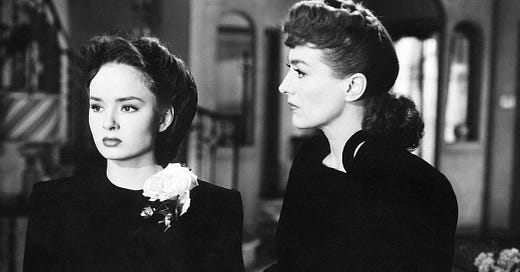


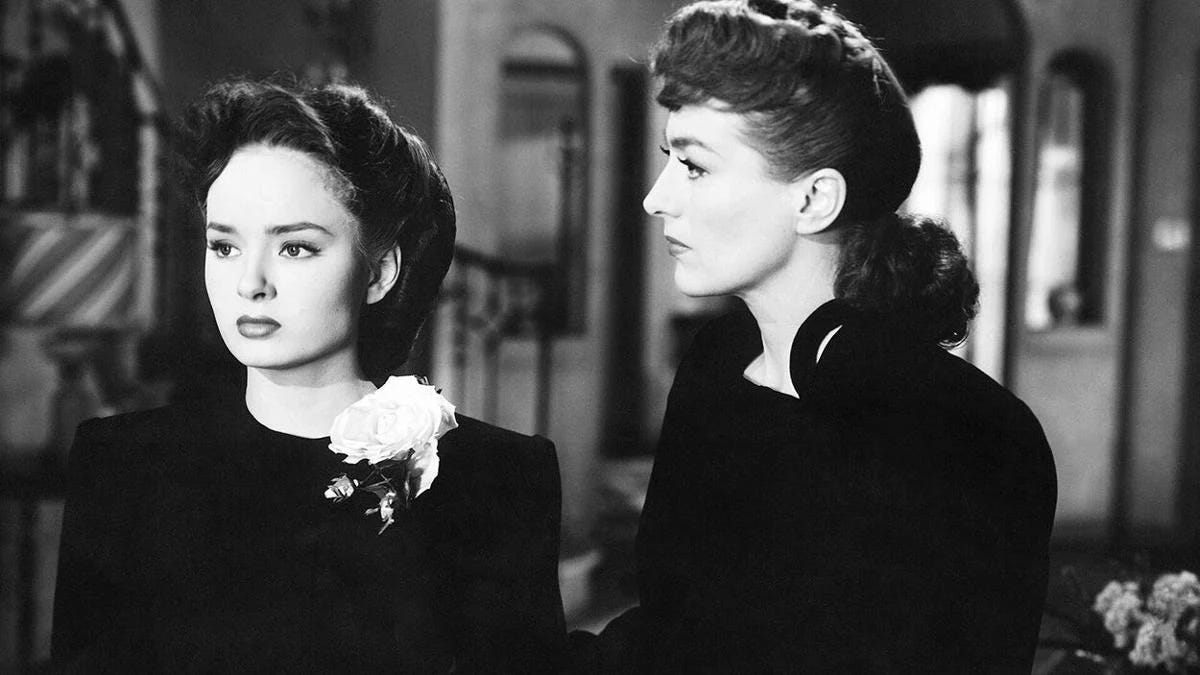
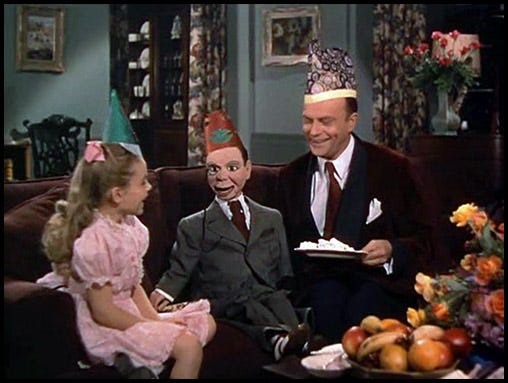
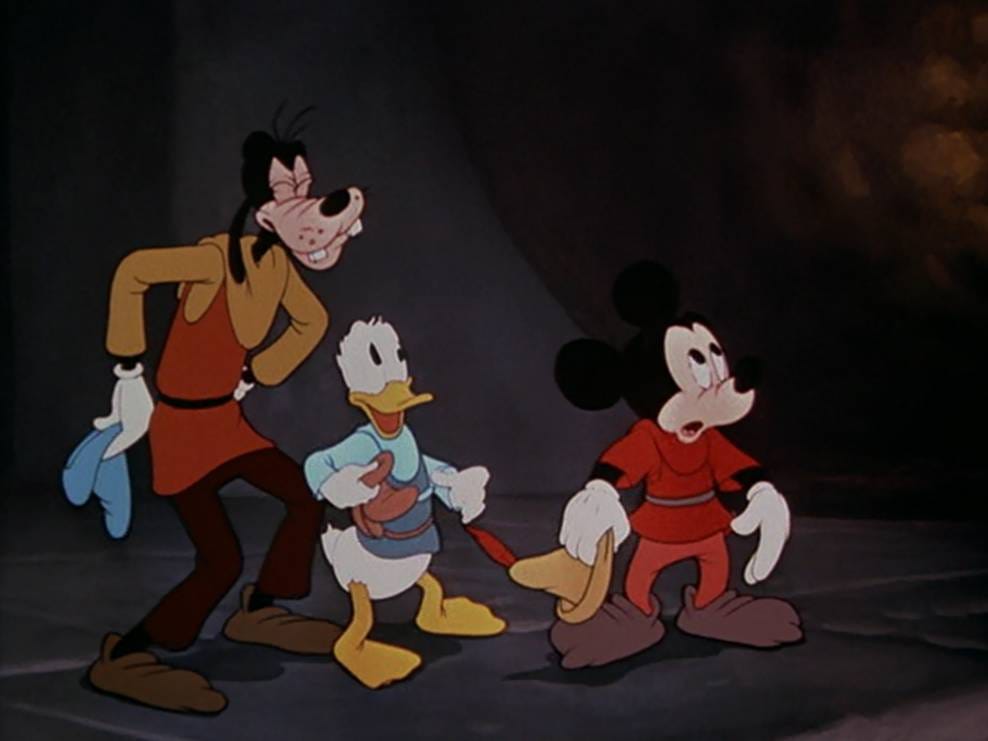

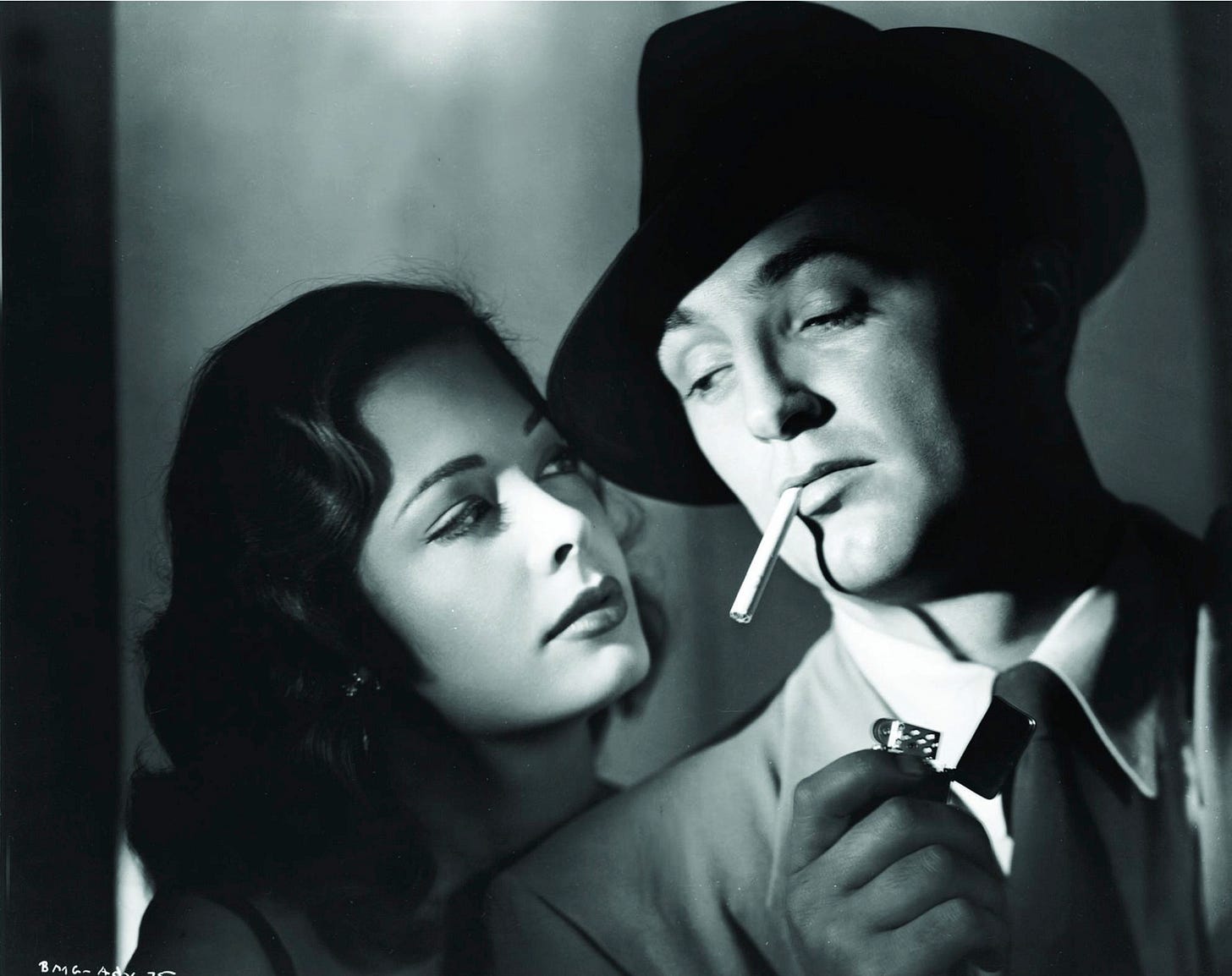
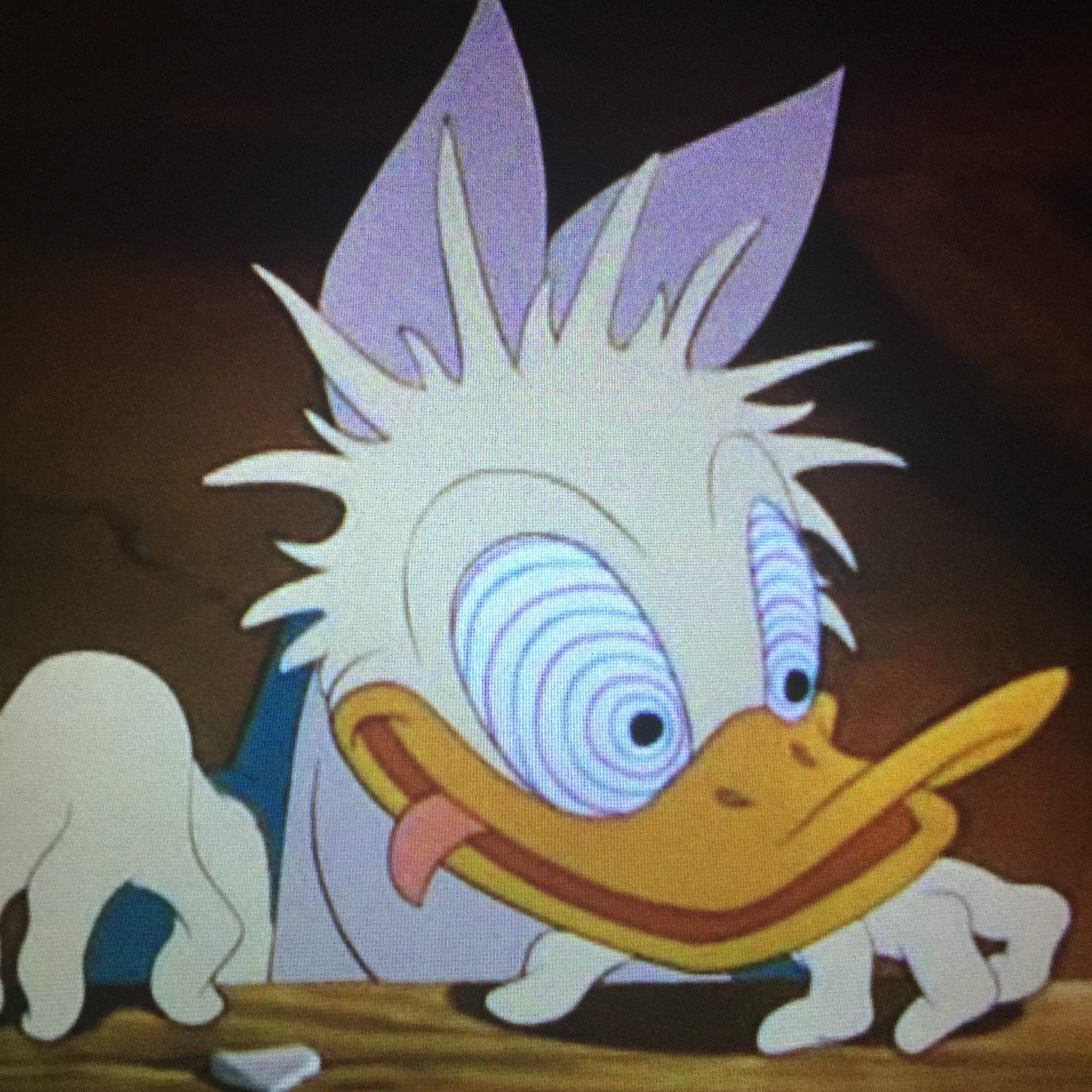


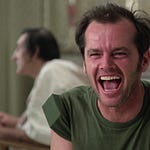

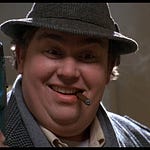
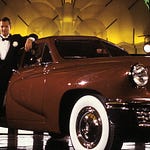



Share this post